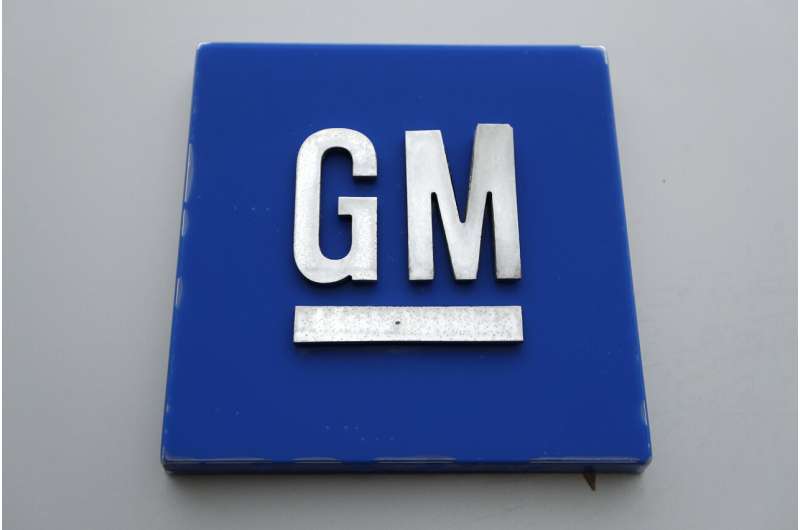A General Motors logo is displayed outside the General Motors Detroit-Hamtramck Assembly plant on Jan. 27, 2020, in Hamtramck, Mich. With the global shortage of semiconductors still crimping U.S auto production, General Motors has signed a deal with chip maker GlobalFoundries to dedicate part of an upstate New York factory to supply the automaker, according to a joint statement from the companies Thursday, Feb. 9, 2023. Credit: AP Photo/Paul Sancya, File
With the global shortage of semiconductors still crimping U.S auto production, General Motors has signed a deal with chipmaker GlobalFoundries to dedicate part of an upstate New York factory to supply the automaker.
In a joint statement from the companies Thursday, Malta, New York-based GlobalFoundries said it will expand production capacity inside its Malta plant exclusively for GM's supply chain.
The factory would supply finished computer chips to GM parts suppliers that manufacture computer modules to control everything from transmissions to brakes to radios.
GM said the deal is for a "long term," but the company wouldn't say how long the agreement lasts. The companies also wouldn't say how many wafers would be produced or release financial details.
"It's a partnership that includes investment from both sides," GF spokeswoman Laurie Kelly said. It will take at least two years for the chips to start flowing as the company installs equipment and chips are designed, she said.
New vehicles now have more than 1,000 chips in them, and that need will only grow with automated driving systems and connectivity that will be expanded in the coming years. GM and other automakers hope to make millions from selling software packages to customers, and chips will be needed to support those.
Doug Parks, GM's head of purchasing and product development, said in the statement that the company expects to double its need for semiconductors over the next several years "as vehicles become technology platforms."
At the same time, GM, the largest automaker in the U.S., is trying to reduce the number of unique chips in each vehicle so the ones used by the company can be produced in higher volumes.
"GF will expand its production capabilities exclusively for GM's supply chain, enabling us to strengthen our partnership with the automotive industry and New York State," Thomas Caulfield, GF's CEO, said in the statement.
The deal won't create any new jobs immediately, but will shore up semiconductor supplies for the auto industry, GF said.
Shares of GM rose 3% in midday trading Thursday.
The auto industry has been hit hard by the global computer chip shortage that surfaced in 2020 as the novel coronavirus pandemic was spreading. Auto plants were forced to shut down early in the pandemic to help prevent the virus from spreading, but came back online faster than expected. At the same time, chipmakers switched production to semiconductors for computers, tablets and games as demand soared.
That left the auto industry with too few chips, forcing companies to slow assembly lines and causing shortages at dealerships, driving up prices. Industry analysts expect the shortage to improve, but to continue at least into 2024.
In an interview last summer, GM CEO Mary Barra said the company is throwing out its old business model of letting parts supply companies acquire the chips with GM knowing little about them. Instead, by 2025, it will move toward three families of chips that Barra said the company will buy and control itself. They will be able to do multiple tasks, eliminating the need for dozens of chips in every vehicle.
That standardization will give GM the scale to buy in bulk and make sure supplies don't get interrupted in the future, Barra said last July. "We're also working with a select group of strategic companies to source these for the volumes. We'll have much better control and a stable supply," she said.
About 86% of GlobaFoundaries shares are owned by the Mubadala Investment Co. of the United Arab Emirates, according to data provider FactSet. The investment company says on its website that it manages assets and generates returns for its shareholder, the government of Abu Dhabi.
© 2023 The Associated Press. All rights reserved. This material may not be published, broadcast, rewritten or redistributed without permission.























